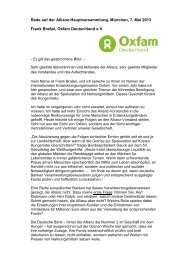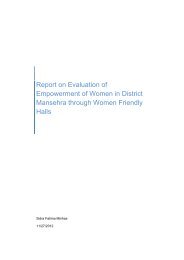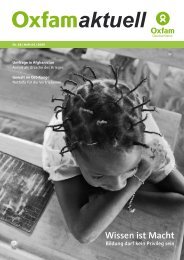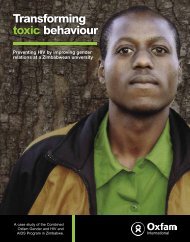FOOD CRISIS IN THE HORN OF AFRICA - Oxfam International
FOOD CRISIS IN THE HORN OF AFRICA - Oxfam International
FOOD CRISIS IN THE HORN OF AFRICA - Oxfam International
You also want an ePaper? Increase the reach of your titles
YUMPU automatically turns print PDFs into web optimized ePapers that Google loves.
poverty who risk losing their livelihoods in such<br />
crises has increased in vulnerable areas such as<br />
the Horn of Africa, and much more does need to<br />
be done by governments and the international<br />
community to address this.<br />
Looking back on 2011, and more pertinently<br />
to 2010, we admit that we – as the entire<br />
international community – were slow to scale up<br />
our work. But once the crisis hit the headlines<br />
and the funds started to come in, I am pleased<br />
with the speed and dedication that <strong>Oxfam</strong> staff<br />
put in to what became a massive response in a<br />
highly complex, fluid, and often very insecure<br />
environment. Particularly noteworthy were the<br />
following: the commitment of <strong>Oxfam</strong>’s local<br />
partners in all three countries to take on more<br />
work; the professionalism of our existing teams<br />
of mainly national staff whose knowledge of<br />
contexts and communities gave invaluable<br />
insights; and the skills and global expertise<br />
of our specialist advisers who travelled to the<br />
region at short notice. <strong>Oxfam</strong> was well placed to<br />
use its existing programs and partnerships as a<br />
platform to extend its coverage, without which<br />
its response would have been weaker.<br />
I am also grateful to <strong>Oxfam</strong>’s supporters. We are<br />
in difficult economic times, yet the generosity<br />
of individuals, companies, and institutions<br />
has been inspiring. This was the largest Africa<br />
appeal that <strong>Oxfam</strong> has ever launched, and one<br />
of its most successful in recent years. Without<br />
these funds, we simply could not have achieved<br />
what we did to save lives, prevent destitution,<br />
and sustain livelihoods. This is a long-term<br />
crisis for many communities in the Horn of Africa<br />
and <strong>Oxfam</strong>’s work is by no means over, but the<br />
commitments of donors meant that we could<br />
make that necessary gear-change when it<br />
mattered most. So thank you.<br />
But doing good emergency work is not enough.<br />
Looking to the future, the humanitarian<br />
community should use the lessons learned<br />
during this crisis to create real momentum<br />
among governments, donors, and partners to do<br />
things differently. We need to make sustained<br />
investments in medium- and longer-term<br />
interventions if we are to break the cycle of food<br />
insecurity. We need to move away from standalone,<br />
quick-in-and-out emergency responses<br />
that keep people alive but do little to protect<br />
or improve livelihoods. Fortunately, it seems<br />
governments and donors are listening.<br />
“<strong>Oxfam</strong> and the United Nations World<br />
Food Programme are in a unique<br />
position to build on the excellent<br />
relationships around the IASC Horn of<br />
Africa Plan of Action. The plan<br />
enhances support to regional and<br />
country-led processes that aim to<br />
address chronic hunger and<br />
malnutrition, build the resilience of<br />
vulnerable livelihoods, and ensure<br />
the early, appropriate, and effective<br />
scale up of assistance in times of<br />
acute crisis.”<br />
Furthermore, <strong>Oxfam</strong> and the United Nations World<br />
Food Programme (WFP) are in a unique position<br />
to build on the excellent relationships around<br />
the IASC Horn of Africa Plan of Action. The plan<br />
enhances support to regional and countryled<br />
processes that aim to address chronic<br />
hunger and malnutrition, build the resilience<br />
of vulnerable livelihoods, and ensure the early,<br />
appropriate, and effective scale up of assistance<br />
in times of acute crisis. We will utilise all of our<br />
strengths: our ability to influence and advocate<br />
at a high level with governments and regional<br />
bodies such as the African Union, and our work<br />
with communities, partners, private sector and<br />
non-governmental organisations (NGOs), to<br />
develop a broad range of interventions that will<br />
help shape a better future for vulnerable people.<br />
<strong>Oxfam</strong> is totally committed to working together<br />
with others – in East Africa, West Africa, and<br />
other regions of the world – to end extreme<br />
hunger.<br />
Jeremy Hobbs<br />
Executive Director, <strong>Oxfam</strong> <strong>International</strong><br />
3


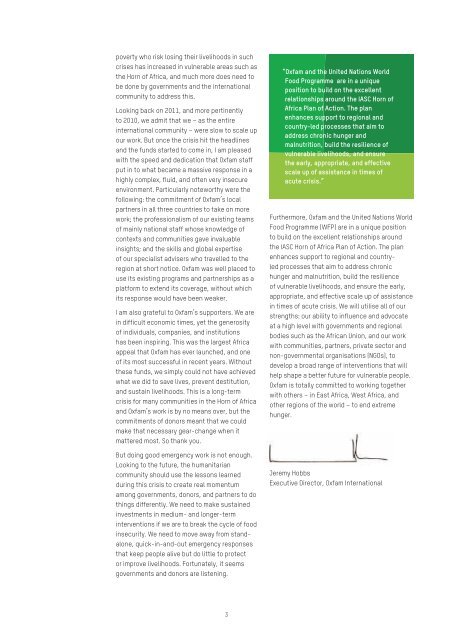
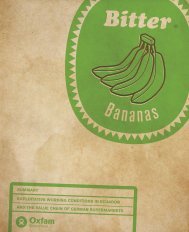
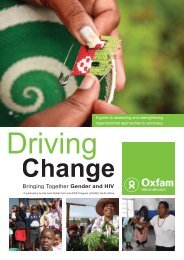

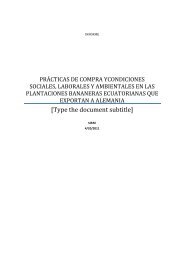
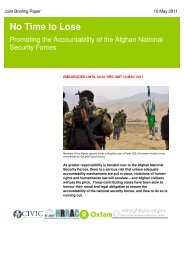
![Download: Faltposter EU-Handelspolitik [PDF 2,17MB] - Germanwatch](https://img.yumpu.com/25095854/1/190x161/download-faltposter-eu-handelspolitik-pdf-217mb-germanwatch.jpg?quality=85)
